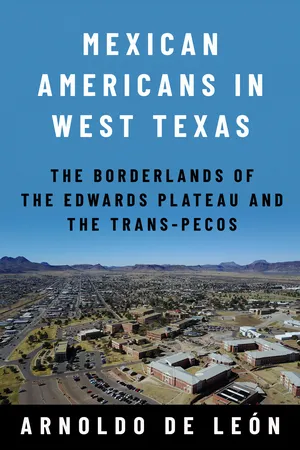
Mexican Americans in West Texas
The Borderlands of the Edwards Plateau and the Trans-Pecos
- English
- ePUB (mobile friendly)
- Available on iOS & Android
Mexican Americans in West Texas
The Borderlands of the Edwards Plateau and the Trans-Pecos
About this book
Mexican Americans in West Texas is an essential work investigating the human geography of a key Texas region. Its scope gives primary attention to the counties generally encompassed by the Edwards Plateau and the Trans-Pecos region, which extends from just past the Hill Country counties of Mason, Gillespie, Kerr, and Bandera, to approximately the Pecos River but also embracing the conterminous subregion that geographers identify as the Permian Basin. This book honors the conventional definition of the Trans-Pecos region, treating it as beginning at the Pecos River and heading west to Hudspeth County, the farthest reach of this endeavor.
A reliance on secondary works very much dictated the time parameters of the study. For the most part, the many county histories, the several collections of essays, and the numerous articles from venues such as the Journal of Big Bend Studies, the West Texas Historical Association Year Book, and the Southwestern Historical Quarterly decreased their coverage of historical occurrences in the region somewhere around the last decades of the twentieth century. Considered broadly, the book may be deemed a synthesis of published accounts that capture the course of events and the flow of historical currents that transpired in the vast expanse west of the 100th meridian.
Mexican Americans in West Texas speaks to the existence of many disparate and disunified secondary sources on West Texas, a region that has been too long overlooked in the history of the Lone Star State.
Frequently asked questions
- Essential is ideal for learners and professionals who enjoy exploring a wide range of subjects. Access the Essential Library with 800,000+ trusted titles and best-sellers across business, personal growth, and the humanities. Includes unlimited reading time and Standard Read Aloud voice.
- Complete: Perfect for advanced learners and researchers needing full, unrestricted access. Unlock 1.4M+ books across hundreds of subjects, including academic and specialized titles. The Complete Plan also includes advanced features like Premium Read Aloud and Research Assistant.
Please note we cannot support devices running on iOS 13 and Android 7 or earlier. Learn more about using the app.
Information
Table of contents
- Preface
- Acknowledgments
- Chapter 1: Entradas, Accommodation, and Implantation to 1880
- Chapter 2: Diminishing Fortunes, Community Building, and Permanence, 1880–1900
- Chapter 3: Change, Challenges, and Cohesion, 1900–1920
- Chapter 4: Years of Transition, 1920–1945
- Chapter 5: Acculturation, Advancement, and Activism, 1945–1970
- Chapter 6: Into the Twenty-First Century
- Notes
- Bibliography
- Index